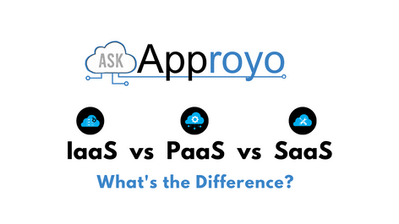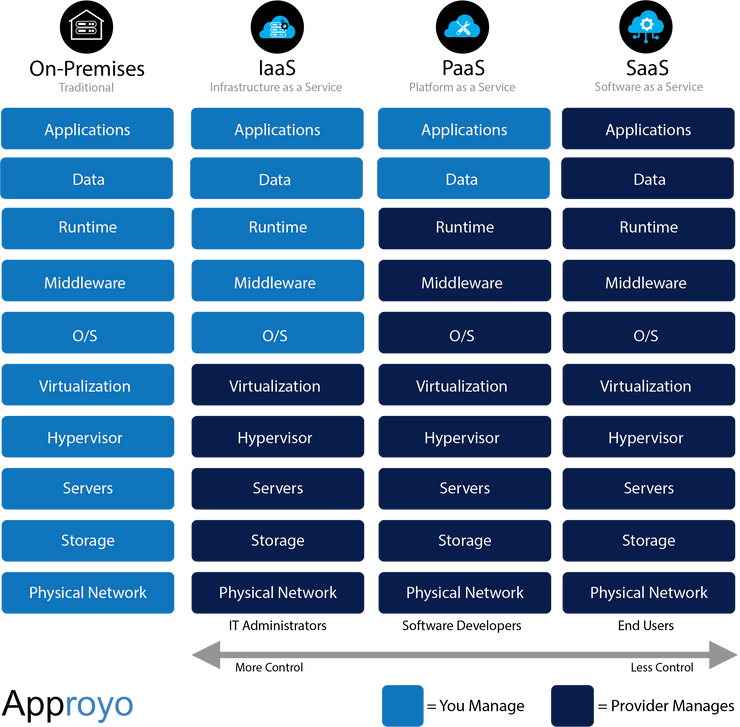Blog
What's the Difference? IaaS vs. PaaS vs. SaaS?
November 25, 2020
November 25, 2020

Cloud computing has become essential to the optimization of enterprise technology. When exploring your options, you will see antonyms like IaaS, PaaS, SaaS, the list goes on. These might just look like a bunch of random letters to you, but they are all "as a service" models.
If you are considering moving to the cloud, there are three main types of cloud computing to consider:
Traditionally companies used an on-premises model, a private cloud in which your hardware is built into your own office. This model costs the most and requires the most internal management. But the three models mentioned above have slowly taken over. We're sure you're wondering what all of these stands for, so let's get into it.
Infrastructure as a Service (IaaS) is a basic service in which your cloud service provider owns and manages the hardware that your software runs on. Meaning you are able to rent IT infrastructure like servers or VM's on a pay-as-you-go basis. With this option, your internal IT team must continue to manage your applications and systems, but will not have to deal with the upkeep of the physical infrastructure. So while your provider will supply the basic compute, storage, and networking infrastructure with a hypervisor, you as the user will have to install, manage, and configure your own operating systems. IaaS requires little commitment to your Cloud service provider and allows you the flexibility to set up your systems in a way that is personal to your business if you have the internal resources that is.
Platform as a Service (PaaS) is similar to IaaS in the fact that your cloud service provider supplies your infrastructure, but they also provide your databases and operating system. It is a supply on-demand environment for developing, testing, delivering, and managing software applications and is designed to avoid the expenses of buying and managing software licenses and other resources. PaaS also includes servers, storage, networking, middleware development tools, business intelligence (BI) services, database management systems, and more, which are all accessible over a secure internet connection on a pay-as-you-go basis. PaaS is mainly used by developers to design their own unique applications without the commitment to buying their own infrastructure or having to start from scratch, saving time in the long run. It is often used to quickly create web or mobile applications while avoiding managing software updates or security patches. PaaS allows for better connectivity between teams, allowing users from multiple locations to access and collaborate on application development.
Software as a Service (SaaS) is when a cloud service provider supplies an entire application stack. Users are able to log in and use the application running on their provider's infrastructure. SaaS usually runs on a monthly subscription payment model with access through the internet, including services such as maintenance, compliance, security. This option gives you the security of knowing that your applications and systems are in good hands, with little input from you. Because SaaS is an out-of-box solution, this option is best for companies who lack the expertise of how to develop or run applications and puts full responsibility on the provider. SaaS helps you reduce costs by canceling the need of an internal IT team to handle hosting, management, and maintenance of software applications and underlying infrastructure.

There are benefits to each and every one of these options, but ultimately the service you choose depends on your budget, security needs, available infrastructure and IT staff availability.
At Approyo, we help optimize your SAP solutions and get the most out of your investment. We take responsibility for all cloud service operations including the hosting of your systems with 24/7 monitoring, BASIS support, local Helpdesk, Backups, OS, along with the ability to scale your systems with minimal downtime. Our global team of experts is available at all times to ensure your systems are operating smoothly, and to handle any requests or questions you have. With our extensive background in SAP, and our range of tailored SAP services and solutions, we can be the MSP that guides you to success. Not only are we a reliable MSP, but we are your personal SAP consultant as well. Looking for more information on how we can benefit your business? Set up a free consultation with our executive team today.